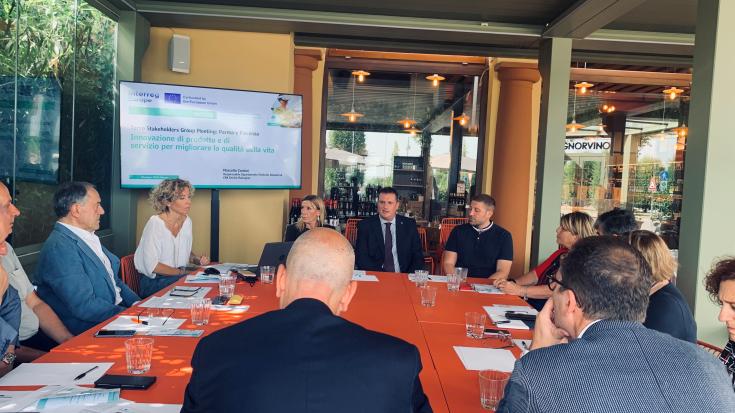Communication & Socialization: Stakeholders Meeting in Italy
On Wednesday, June 19th, CNA Parma and CNA Piacenza, supported by CNA Emilia-Romagna, organized the "Third Local Stakeholders Group Meeting - Product and Service Innovation to Improve Quality of Life" at the Fidenza Village. Following the Second Local Stakeholders Group Meeting, this session involved the Emilia-Romagna Region as an associated partner and included key stakeholders presenting the most significant ongoing experiences in public and private investments in healthcare, social, and business sectors supporting the silver economy.
Participants included Giovanni Rivaroli, President of CNA Piacenza; Antonio Nouvenne, Councillor for Integration Policies between Hospital and Territory for the Municipality of Parma; Giovanni Gelmini, Director of the South-East District AUSL; Adonella Visconti, Head of Nursing and Midwifery Professions at ASL Piacenza; Marcello Maggio, President of the Medicine and Surgery Degree Course and Director of the School of Specialization in Geriatrics at the University of Parma; Enrico Paccini, Managing Partner of eDialog srl; Italo Pasotti, CEO of Niverbec srl; Manuela Ratta, Service for Sustainable Innovation, Enterprises, and Productive Chains at the Emilia-Romagna Region; Laura Boeri, President of CNA Pensionati Parma; and Giuseppe Guasconi, President of CNA Pensionati Piacenza. The initiative was concluded by Enrica Gambazza, Director of CNA Piacenza, and Andrea Allodi, Director of CNA Parma.
Marcella Contini, Head of the Industrial Policies Department at CNA Emilia-Romagna, coordinated the discussion and presented the international project.
The key aspects discussed during the meeting emphasized the need to address the challenge of demographic aging through the mutual collaboration of all stakeholders, from public to private sectors. Investing in communication and socialization is fundamental, as it not only improves the quality of life for the elderly, but also creates more cohesive and resilient communities.
Addressing the challenge of demographic aging requires a holistic and multidimensional approach involving the entire community. While technological innovation plays an important role, the key to success lies in combining social policies, community initiatives, and networking. The challenge is to work together to create a proactive environment to combat loneliness and develop projects and activities that help the elderly remain socially active and connected.
Dealing with demographic aging is complex and requires services combining technology, community, and social policies. Telemedicine is a key component, and the Emilia-Romagna Region is investing to improve the quality of life for the elderly. The region is at the forefront of this sector, thanks to various innovative initiatives and the implementation of digital platforms that enable online medical consultations, remote health monitoring, and therapy management. Keeping the elderly at home as much as possible, monitoring them remotely, and preventing hospitalization are important goals for improving their quality of life and reducing healthcare costs. The Emilia-Romagna Region has implemented several initiatives to support this approach, with telemedicine and elderly mapping being concrete examples.
Small and medium-sized enterprises (SMEs) also play a central role in this ambitious challenge, offering innovative technological solutions that enhance the quality of life for the elderly, contributing positively to their well-being, and making home and healthcare services more efficient. These initiatives not only improve the well-being of the elderly but also help create a more efficient and sustainable healthcare system.
Supporting this important change, the Emilia-Romagna Region is committed to allocating new funds and increasing support for enterprises to ease their economic efforts. Associations, on their part, pledge to support businesses and widely disseminate social and technological innovation across the territory.

